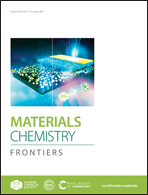Recent advances in vanadium-based cathode materials for rechargeable zinc ion batteries
Abstract
The fast depletion of lithium resources has led to active research work on other emerging electrochemical energy storage systems. Among those, many studies have focused on the development of cathode materials of zinc ion batteries for even higher energy efficiency, outstanding rate capability, remarkable power density, and longer lifetime. Vanadium-based nanomaterials show fast ion diffusion and excellent reversible capacity because of their rich valence state of vanadium, facile distortion of V–O polyhedrons, and tunable chemical composition, offering great opportunities for developing emerging energy storage technologies. This article systematically reviews vanadium-based nanomaterials in the cathode materials for zinc ion batteries, aiming to present a comprehensive discussion. Herein, we group vanadium-based cathode materials into three categories including vanadium oxides, vanadates, and vanadium phosphates. The cathode electrochemical performance, improvement strategies, structural stability, and zinc storage mechanism are reviewed in detail. Lastly, the existing bottlenecks and prospects are provided for further progressive research.

- This article is part of the themed collection: 2021 Materials Chemistry Frontiers Review-type Articles


 Please wait while we load your content...
Please wait while we load your content...